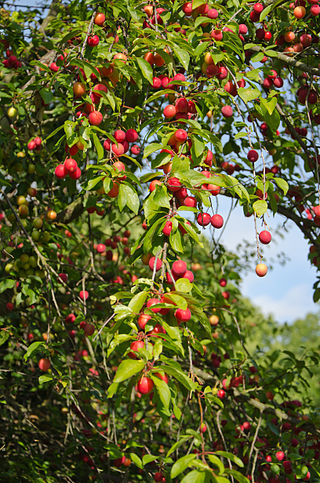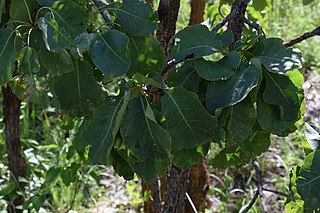
A plum is a fruit of some species in Prunus subg. Prunus. Dried plums are most often called prunes, though in the United States they may be just labeled as 'dried plums', especially during the 21st century.
Quandong, quandang or quondong is a common name for the species Santalum acuminatum, especially its edible fruit, but may also refer to:

Bandipur National Park is a national park covering 868.63 km2 (335.38 sq mi) in Chamarajnagar district in the Indian state of Karnataka. It was established as a tiger reserve under Project Tiger in 1973. It is part of the Nilgiri Biosphere Reserve since 1986.

Prunus cerasifera is a species of plum known by the common names cherry plum and myrobalan plum. It is native to Southeast Europe and Western Asia, and is naturalised in the British Isles and scattered locations in North America. Also naturalized in parts of SE Australia where it is considered to be a mildly invasive weed of bushland near urban centers.

Terminalia is a genus of large trees of the flowering plant family Combretaceae, comprising nearly 300 species distributed in tropical regions of the world. The genus name derives from the Latin word terminus, referring to the fact that the leaves appear at the very tips of the shoots.

Terminalia bellirica, known as baheda, bahera, behada, beleric or bastard myrobalan, Persian بلیله (Balileh), Sanskrit: Vibhītaka बिभीतक, Aksha अक्ष) is a large deciduous tree in the Combretaceae family. It is common on the plains and lower hills in South and Southeast Asia, where it is also grown as an avenue tree. The basionym is Myrobalanus bellirica Gaertn.. William Roxburgh transferred M. bellirica to Terminalia as "T. bellerica (Gaertn.) Roxb.". This spelling error is now widely used, causing confusion. The correct name is Terminalia bellirica (Gaertn.) Roxb.

Terminalia ferdinandiana, most commonly known as the Kakadu plum and also called the gubinge, billygoat plum, green plum, salty plum, murunga, mador and other names, is a flowering plant in the family Combretaceae, native to Australia, widespread throughout the tropical woodlands from north-western Australia to eastern Arnhem Land. Used as a traditional bush food and bush medicine for centuries, the fruit has especially high levels of vitamin C.
Mastic tree is a common name for several plants and may refer to:
Billygoat plum is a common name for several plants and may refer to:

Terminalia chebula, commonly known as black- or chebulic myrobalan, is a species of Terminalia, native to South Asia from India and Nepal east to southwest China (Yunnan), and south to Sri Lanka, Malaysia, and Vietnam.
Cowtail pine is a common name for several plants and may refer to:
Bully tree is a common name for several neotropical trees in the family Sapotaceae and may refer to:
Wild plum is a common name for several trees with edible fruits, and may refer to:

Planchonia careya is a tree species in the family Lecythidaceae. Common names include cocky apple, cockatoo apple and billygoat plum. The species should not be confused with Terminalia ferdinandiana, with which it shares some common names. The 1889 book 'The Useful Native Plants of Australia’ records that Indigenous Australians of the Mitchell River area referred to this plant as "Ootcho" while those of the Cloncurry River area referred to it as "Go-onje" and "Gunthamarrah".
Yellow plum may refer to:

Terminalia microcarpa is a tree species in the family Combretaceae. It occurs throughout the Philippines, in parts of Malaysia and Indonesia, Papua New Guinea, possibly the Bismarck Archipelago, and northern Australia. It is cultivated on a small scale in the Philippines, where the edible sweet and tart plum-like fruits are eaten as is or are traditionally made into jams, jellies, and wines.

Mesir Macunu is a traditional Turkish sweet associated with the city of Manisa. Earlier versions of Mesir macunu were not sweet, but rather spicy in flavor.
This page is based on this
Wikipedia article Text is available under the
CC BY-SA 4.0 license; additional terms may apply.
Images, videos and audio are available under their respective licenses.









